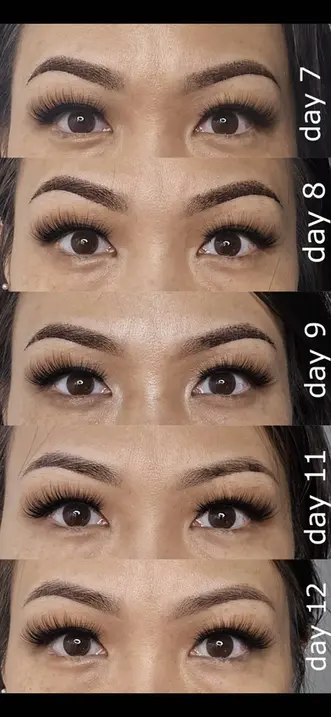
cosmetic tattoo aftercare
COSMETIC TATTOO AFTERCARE


14


Immediately After Your Procedure
-
You can expect the treated area to feel tender, slightly swollen, or tight for the first few days. This is completely normal and part of the healing process.
-
If a light scab or crust forms, do not pick, peel, or scratch it. Allow the skin to exfoliate naturally—premature removal can lead to pigment loss and uneven healing.
Healing & Moisturizing
-
Keep the area lightly moisturized using a rice grain-sized amount of the provided healing sealant.
-
Apply 2–3 times daily (morning, night, and mid-day) for at least 7 days.
-
Use a clean cotton swab or sanitized fingertip to apply—especially for brows or lips.
What to Expect During Healing
-
Brows and eyeliner may start to exfoliate within 3–5 days; lips may take slightly longer.
-
Brows and eyeliner typically complete their surface healing in 7 days.
-
The color will soften by 30–40% from what you see immediately after your session. This is normal.
-
The final healed results will appear softer, more natural, and take a few weeks to fully settle.
Important Healing Restrictions (First 7–14 Days)
To protect the treated area and your results:
❌ Do not expose the area to:
-
Direct sun or tanning beds (for at least 1 month)
-
Water immersion (e.g. baths, swimming pools, hot tubs, saunas, steam rooms)
-
Heavy sweating, gym workouts, or excessive heat
-
Makeup, skincare creams, scrubs, or ointments (except your healing sealant)
-
Direct shower spray or facial cleansing over the area
✅ Do:
-
Avoid touching the treated area with unwashed hands
-
Keep the area dry and clean
-
Use a clean pillowcase
-
Let the skin flake or exfoliate naturally
Note: No makeup should be applied on or near the area until fully healed.
Long-Term Care & Maintenance
-
Use a high-SPF sunscreen when exposed to the sun—this helps prevent fading over time.
-
Avoid prolonged sun exposure, harsh exfoliants, or chemical peels on the treated area.
-
If you undergo laser treatments, MRIs, or chemical peels, inform your provider that you have cosmetic tattooing.
-
Be aware: Some lasers may alter pigment color if not properly disclosed to your provider.
Touch-Up & Color Boosts
-
To maintain color and shape, a touch-up is recommended within 1 year of your initial procedure. Regular maintenance will help keep your results fresh and natural-looking.
Blood Donation Notice
-
If you donate blood, the Red Cross requires a 12-month waiting period after any tattoo procedure—including permanent makeup.
-
Following these guidelines will support proper healing and the best long-term results. If you have any questions during healing, don’t hesitate to reach out.
Healing Stages



